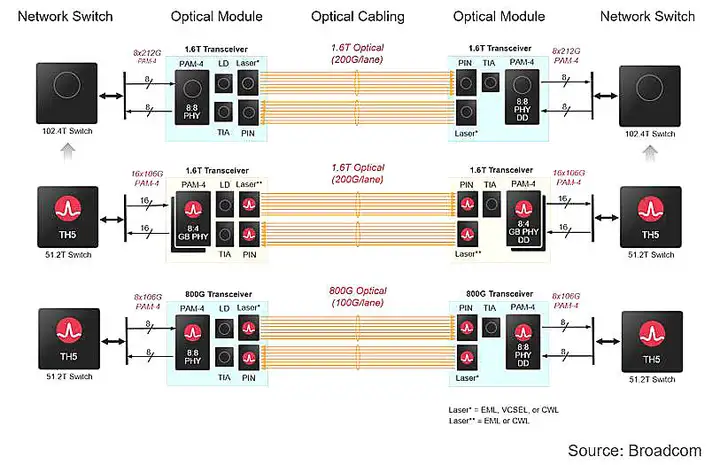Recently, LightCounting, a market organization in the optical communications industry, pointed out in a market report that last year's module suppliers had already demonstrated the first batch of 1.6T optical modules, and this year, DSP suppliers are focusing on the future of the second-generation 1.6T module design. These cutting-edge technological breakthroughs not only represent a leap in data transmission speed, but also a profound reshaping of future network architectures.
Innovation of 1.6T modules
The first batch of 1.6T modules closely connected 16x100G host interfaces with 8x200G optical devices (16:8), achieving a huge increase in data transmission. The next generation design is perfectly matched with the upcoming 200G/channel switch ASIC, indicating that data transmission will be more efficient.

Evolution of DSP technology
In this wave, giants such as Broadcom, Marvell, and MaxLinear have all made efforts. Broadcom took the lead in releasing its Sian2 1.6T 8:8 DSP at an investor event in March, leading the industry trend. Following closely, Marvell launched a similar Nova 2 at the OFC conference, forming a strong competitive situation with Broadcom. MaxLinear, not to be outdone, pre-released Rushmore. Although product details have not yet been revealed, the news that Samsung Foundry is its manufacturing partner is enough to attract widespread attention in the industry.
The rise of LPO and LRO
Meanwhile, linear pluggable optics (LPO) and other non-full DSP variants are making significant progress towards 100G/channel. Credo Semiconductor pioneered transmit-only 800G PAM4 DSP for semi-retiming modules, now called Linear Receive Optics (LRO). Marvell has launched Spica Gen2-T as a transmit-only version of the 5nm 800G DSP, further promoting the development of LRO.
The high cost and high power of DSP, as well as customers' strong interest in LPO, provide start-ups with rare development opportunities. TeraSignal's smart redriver, with its unique IC design and CMOS process, provides strong support for 400G and 800G LPO modules. NewPhotonics demonstrated 200G/channel equalization technology in the optical domain, and its PIC integrates modulators and lasers, further improving the stability and efficiency of data transmission.
Diversification of PAM4 optical devices
OFC 2024 fully demonstrated the diverse designs of PAM4 optical devices. 3Coptics' 100G single-fiber and 200G/400G dual-fiber series both use PAM4 DSP technology, providing users with a wealth of choices. With the large-scale development of AI backend networks, reducing power has become an important issue for short-distance optical devices. The rapid shift of the DSP and LPO battle to 200G/channel design makes us look forward to technological innovation in 2025.
In the future field of optical communications, 3Coptics will continue to pay attention to the evolution and development of these cutting-edge technologies and jointly welcome the arrival of a new era of optical communications!


